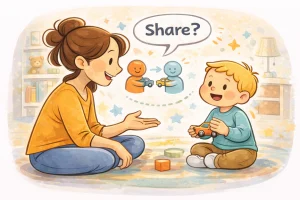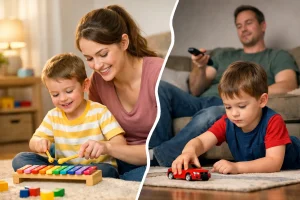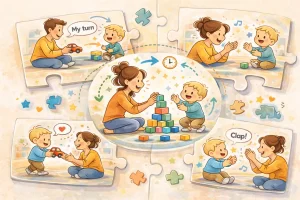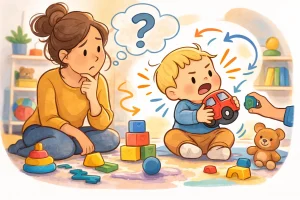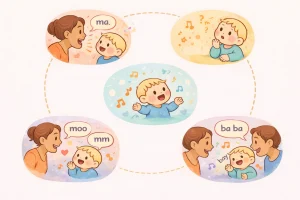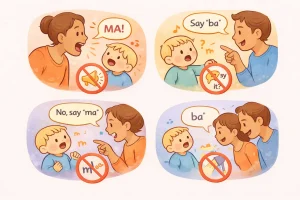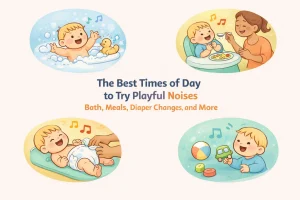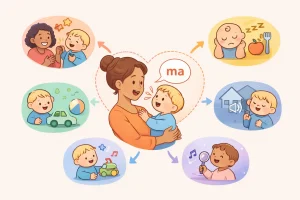Speech App With WH Questions, Emotions, and Vocabulary
By Wellness Hub
Last Updated: July 7, 2025
Is your child struggling to answer simple “what” or “where” questions—or finding it hard to express how they feel? These aren’t just small hiccups in communication—they’re key milestones in your child’s speech and language journey.
That’s where the BASICS App steps in—a powerful, expert-built speech app with WH questions, vocabulary practice, and emotional learning tools all wrapped into one engaging platform. Whether your child has a speech delay, autism, ADHD, or is simply learning to talk, BASICS provides structured support across 12 interactive levels designed for ages 2 to 8.
Why WH Questions Matter in Child Development
One of the most important building blocks of language development is the ability to understand and answer WH questions—like What, Where, Who, When, Why, and How. These questions help children make sense of the world around them and play a vital role in how they learn, think, and communicate.
What Are WH Questions—and Why Are They Important?
WH questions for kids are more than just conversation starters. They are powerful tools for building critical thinking, listening comprehension, and verbal expression. When children learn to respond to questions like “What is this?”, “Where is your toy?”, or “Why are you sad?”, they begin to understand relationships between objects, actions, events, and emotions.
Mastering WH questions also supports academic learning and social interaction. For example:
- “Who is your friend?” encourages naming and social awareness.
- “When do we eat lunch?” helps with time concepts and routine understanding.
- “Why are you crying?” builds emotional expression and problem-solving.
Children with speech delays, autism, or ADHD may find these types of questions challenging—which is why a structured, engaging approach makes all the difference.
How the BASICS App Makes WH Question Learning Fun and Effective
The BASICS App turns learning WH questions into an enjoyable experience using visual prompts, interactive stories, and picture-based activities tailored for young learners. In the app’s Inquiry Island Level, kids explore “What,” “Where,” “Why,” and other questions in context—using clear visuals, voiceovers, and reward-based gameplay.
Each Set in this level introduces:
- A specific WH question type
- Real-life, relatable images or scenarios
- Simple, guided interactions that reinforce understanding
For example, a child might be shown a picture of a playground and asked, “Where is the swing?” The app guides them to tap the correct area, followed by cheerful reinforcement and visual feedback. Over time, this repeated and positive practice strengthens comprehension, attention, and spoken language.
Parents can choose to follow a Goal Mode where WH questions are introduced in a structured sequence or freely explore relevant Sets in Library Mode based on the child’s readiness.
Helping Kids Understand and Express Emotions
Understanding emotions is just as important as learning words—and for many children, especially those with autism or speech delays, it can be one of the hardest parts of communication. Teaching kids how to recognize, name, and manage their feelings is a key step in building strong language, social skills, and confidence.
That’s why emotional development is a core part of modern speech therapy—because communication isn’t just about what you say, but how you feel when you say it.
Why Emotional Understanding Matters
From a young age, children experience a wide range of emotions—happiness, anger, fear, excitement—but they may not always have the words to express them. When a child struggles to say “I’m sad” or “I’m scared,” it often leads to frustration, meltdowns, or withdrawal.
By helping children name their feelings and understand the emotions of others, we’re teaching them:
- How to express themselves clearly
- How to navigate social situations
- How to build empathy and emotional control
For kids with autism or developmental challenges, this kind of structured support is especially helpful. That’s where a good emotion learning app for children can make a big difference.
How the BASICS App Supports Emotional Learning
The BASICS App is more than just a speech tool—it’s also a powerful social skills app for autism and emotional development. Two key Levels focus specifically on feelings and behavior:
Emotions Explorer
This Level is designed to help children:
- Identify facial expressions and match them to feelings (happy, sad, angry, etc.)
- Use simple words to label their own emotions
- Understand how situations can trigger different emotional responses
Activities include expressive visuals, interactive picture choices, and gentle prompts like “How do you feel?” or “What face shows happy?”
Social Stories
Here, kids explore real-life situations through simple first-person narratives:
- Going to school
- Making friends
- Feeling left out
- Managing frustration or sharing toys
These story-based lessons help children relate to everyday challenges and see how different emotions come up—and how to respond appropriately.
The Power of Visual Supports
Visual learning plays a big role in emotional development. Children often respond better to pictures than to words alone—especially when they’re still building their vocabulary.
In the BASICS App, every emotion-related activity uses:
- Expressive faces and body language
- Scenario-based images (e.g., child dropping an ice cream, child hugging a parent)
- Simple, supportive voiceovers to reinforce feelings and responses
These tools help make feelings recognition easier and more natural—even for children who are nonverbal or have limited speech.
Building a Strong Vocabulary Foundation With BASICS
When it comes to helping children speak confidently, vocabulary is where it all begins. The more words a child understands and can use, the easier it becomes for them to express their thoughts, ask questions, and connect with the world around them. That’s why a strong vocabulary foundation is at the heart of early language development—and it’s one of the key goals of the BASICS App.
Whether your child is just starting to talk or needs extra support due to a speech delay or developmental challenge, this vocabulary app for toddlers offers a fun, structured way to grow language skills—one word at a time.
Why Vocabulary Matters in Speech Development
Vocabulary isn’t just about knowing lots of words. It’s about:
- Understanding word meanings and categories
- Using the right words to describe objects, actions, and emotions
- Combining words into short phrases and sentences
Children with limited vocabulary often struggle to communicate clearly, which can lead to frustration or behavioral issues. That’s why early, engaging vocabulary exposure is so important—and why many therapists recommend using an early language learning app at home to reinforce what kids are learning.
How BASICS Makes Vocabulary Learning Fun and Effective
The BASICS App includes three powerful Levels focused on vocabulary building:
Vocabulary Valley
In this Level, children learn:
- Word categories (e.g., animals, fruits, clothing)
- Object identification and naming
- Categorization and association (e.g., “Which one is a fruit?”)
Activities include drag-and-drop matching, audio word prompts, and picture-based sorting games—all designed to improve both understanding and expression.
Word Wonders (Video Modeling)
This Level uses real videos of children saying first words, making it easier for kids to imitate and learn naturally. Categories include:
- Animals
- Food
- Emotions
- Body parts
- Toys
- Everyday objects
It’s especially useful for toddlers and visual learners who respond well to peer modeling and repetition.
Phrase Park
Once your child knows some words, they can start combining them! Phrase Park introduces:
- Color + Object phrases (e.g., “red ball”)
- Action + Object phrases (e.g., “eat apple”)
- Simple sentence building using visual prompts and interactive tools
These activities help children move from single words to early phrases—an important milestone in speech and language growth.
Engaging, Interactive Activities That Boost Learning
Unlike traditional flashcards or worksheets, the BASICS App keeps kids motivated with:
- Tap-and-match games
- Drag-to-group activities
- Visual storytelling and animations
- Voice prompts and positive reinforcement
All vocabulary activities are designed by speech-language experts and tested with real children, ensuring that they’re not only effective but also fun.
Inside the BASICS App: Structured Levels for Every Skill
What makes the BASICS speech app stand out from others is its clear, level-based structure—designed by speech therapists, occupational therapists, behavioral experts, and special educators. Instead of offering random games or general practice, BASICS gives your child a step-by-step journey through key developmental areas, from speech sounds and vocabulary to emotions, cognition, and early academics.
Each level is thoughtfully crafted to target specific skills, and every activity is part of a therapist-approved learning path that builds on progress over time. Whether your child is just starting to talk or needs extra help due to autism, ADHD, or learning delays, these structured speech activities are tailored to meet them where they are.
How the BASICS App Builds Speech, Cognition, and Emotional Intelligence
BASICS is more than a speech tool—it’s a complete speech therapy app for autism and early learners, guiding children through everything from first sounds to real-life conversations. Each of the 12 Levels is built with intentional goals and grouped into smaller Sets for manageable progress.
Let’s explore the 12 structured Levels inside the app:
Here’s your content in a clean, easy-to-read table format:
| Level | Name | Focus & Activities |
|---|---|---|
| Level 1 | Foundation Forest | Matching, memory games, sounds, colors, and pre-math activities for toddlers beginning their learning journey. |
| Level 2 | Articulation Adventure | Practice 24 speech sounds in initial, middle, and final positions to improve clarity. |
| Level 3 | Word Wonders (Video Modeling) | Child-led videos teach first words in categories like animals, food, toys, emotions, and body parts. |
| Level 4 | Vocabulary Valley | Drag-and-drop games, matching, and naming activities to build word recognition and category understanding. |
| Level 5 | Phrase Park | Visual cue-based phrase formation (e.g., color + object, action + object) to encourage early phrase building. |
| Level 6 | Spelling Safari | Early literacy through phonics games like missing letters, drag-to-spell, and word recognition. |
| Level 7 | Inquiry Island | WH question practice (What, Where, Who, Why, When, How) using visual prompts to support comprehension and response. |
| Level 8 | Conversation Circles | Teaches greetings, turn-taking, answering questions, and participating in back-and-forth communication. |
| Level 9 | Social Stories | Relatable short stories that teach behavior, emotional regulation, and everyday social rules. |
| Level 10 | Sentence Symphony | Sentence-building using sequencing, visuals, and guided options to help children create complete thoughts. |
| Level 11 | Emotions Explorer | Interactive activities for identifying, naming, and understanding emotions and expressions. |
| Level 12 | Math Magic | Foundational math concepts like counting, comparing, and problem-solving introduced through playful activities. |
Each level contains hundreds of therapist-designed Sets and Activities, offering both structure and flexibility. As your child progresses, they unlock Adventures that keep learning exciting—whether it’s helping a dinosaur cross a bridge or making a magical rainbow salad!
Therapist-Guided Learning vs. Child-Led Exploration
Every child learns differently—and the best learning tools know how to adapt. That’s why the BASICS speech app with guided therapy offers two flexible modes to meet the needs of both structured learners and free explorers: Goal Mode and Library Mode. Whether you’re a parent working on daily practice or a therapist planning sessions, this approach gives you control, clarity, and convenience.
Goal Mode: Structured, Therapist-Guided Learning
Goal Mode is ideal for families who want a step-by-step therapy plan. Built by experts, it organizes your child’s learning into clear developmental goals like:
- Learning First Words
- Understanding WH Questions
- Building Early Phrases
- BASICS for 2–3 Years
Each Goal contains 100–120 Sets, broken into Chapters (6 Sets per Chapter). As your child completes each Set, they progress through fun, animated Adventures—like helping Toby the T-Rex cross a bridge or feeding Mighty the Mammoth fruits. This structure not only keeps kids motivated but also ensures steady growth.
Parents can:
- Choose or change Goals anytime
- Track progress through each Chapter
- Customize which Adventures appear
Goal Mode is especially helpful for children in speech therapy, as it aligns with therapist-recommended sequences and targets key milestones.
Best for: Consistent daily practice, home therapy, and progress tracking
Library Mode: Free, Child-Led Learning
Not every child wants a fixed path—and that’s okay. Library Mode offers open-ended exploration, letting you access all content directly by:
- Level (e.g., Emotions Explorer, Phrase Park)
- Group (focused skill clusters)
- Set (specific learning activity)
This child-led learning app feature is perfect for:
- Children who love to choose what they learn
- Therapists customizing sessions on the fly
- Parents who want to reinforce specific skills (e.g., just WH questions or just speech sounds)
Switching between Library Mode and Goal Mode is seamless—so you can follow your child’s curiosity one day, and return to structured goals the next.
Best for: Therapy sessions, skill-focused practice, and child-directed learning
Built for Real-Life Flexibility
What makes the BASICS app so effective is its flexibility. Whether your child thrives with routines or prefers variety, you can easily switch between guided and free modes. This makes it easier for:
- Parents to support learning at home
- Therapists to plan engaging sessions
- Kids to stay motivated and feel in control
Who Can Benefit From the BASICS App?
The BASICS App is thoughtfully designed to support a wide range of children—whether they need speech therapy, extra language help, or just a fun, educational head start. Created by therapists and special educators, it’s trusted by thousands of families and professionals as one of the best apps for speech delay, autism, and early learning.
If you’re wondering whether this app is right for your child, here’s who can benefit most from it:
Children With Speech Delays
Many toddlers take time to start speaking—but when delays persist, targeted support becomes essential. BASICS is a powerful speech therapy app for toddlers that focuses on:
- First words and sounds
- WH questions and sentence building
- Vocabulary and expression
The app offers structured Sets and therapist-guided Goals that help children gradually build the skills needed for clear, confident communication—all while having fun.
Kids With Autism, ADHD, or Learning Challenges
Children with autism or ADHD often struggle with:
- Communication
- Social interaction
- Emotional understanding
- Focus and routine
BASICS is designed with these needs in mind. As a leading app for autism kids, it offers:
- Visual stories and structured learning
- Clear routines through Goal Mode
- Social skills practice with turn-taking, greetings, and emotional labeling
- Interactive, low-pressure activities that adapt to each child’s pace
It’s not just an app—it’s a supportive learning space where kids feel safe, seen, and successful.
Neurotypical Kids Who Need a Boost in Language or Early Academics
Even children without any diagnosed delay can benefit from the BASICS App. For neurotypical kids aged 2 to 8, it acts as an early learning companion, helping build:
- Vocabulary
- Sentence formation
- Emotional awareness
- Pre-academic skills like matching, counting, and spelling
Whether your child is preparing for preschool, learning English as a second language, or just loves screen time with a purpose, BASICS turns play into progress.
Best For Ages 2–8 Years
BASICS is developmentally appropriate for children between the ages of 2 and 8. Whether they’re:
- Just starting to babble
- Saying their first few words
- Or forming simple sentences
The app meets them at their level and grows with them—making it a long-term companion for speech, cognitive, and emotional development.
Parent-Friendly Features and Extra Support
Supporting your child’s development doesn’t stop with an app—it’s a daily journey that includes your voice, your encouragement, and the tools you use at home. That’s why the BASICS App doesn’t just focus on children—it’s built to empower parents and caregivers too.
Whether you’re new to speech therapy or looking for practical ways to help at home, BASICS offers parent speech therapy support through a library of easy-to-use resources, guides, and tools—right inside the app.
Printable Tools That Make Home Practice Simple
BASICS includes hundreds of downloadable, printable materials created by real therapists—so you can turn everyday moments into learning opportunities.
Some of the most helpful resources include:
- Flashcards for speech therapy – Covering first words, speech sounds, categories, and more
- WH Question Packs – Visual prompts to help your child practice “what,” “where,” “why,” and “who” questions
- Emotion Charts – Great for helping kids identify and communicate their feelings
These printable are perfect for home speech therapy tools, daily routines, therapy sessions, or even quick practice before school.
Short, Practical Videos Just for Parents
Not sure how to teach first words? Or wondering how to support your child’s toilet training or emotional development? The BASICS App offers a growing library of parent learning videos—short, practical, and therapist-approved.
Topics include:
- Teaching first words naturally
- Understanding and using WH questions
- Encouraging speech at home
- Managing behavior gently
- Toilet training tips
- Building pre-writing and fine motor skills
- Supporting emotional regulation
These videos are clear, friendly, and easy to follow—even if you’re new to speech therapy or early development strategies.
One App, One Destination—Everything Parents Need
With BASICS, you don’t need to search the internet for speech tips, printable, or emotion visuals. It’s all in one place. Whether your child is using the app to build speech skills or you’re using it as a home therapy companion, it’s designed to work for the whole family.
You can:
- Learn while your child learns
- Use ready-made resources at home or in therapy
- Get guidance from experts without needing to schedule extra sessions
Conclusion
The BASICS App is one simple tool that builds many important skills—WH questions, emotions, and vocabulary—all in one place. It’s a trusted speech app for children, designed by experts to support kids with speech delays, autism, ADHD, or early learning needs. With fun visuals, structured levels, and parent-friendly tools, it’s the perfect vocabulary and emotion app for kids too. Early help leads to better communication, and BASICS makes it easy.
Frequently Asked Questions:
1. What is the BASICS App used for?
The BASICS App is a complete early development tool designed to help children aged 2 to 8 build communication, emotional, and learning skills. It supports kids with speech delays, autism, ADHD, and even neurotypical children who are just starting to speak or preparing for preschool. With fun games, visual prompts, and structured levels, the app makes learning WH questions, vocabulary, emotions, and sentence building simple and engaging.
2. Is the BASICS App good for children with speech delay?
Yes, it’s one of the best apps for speech delay. BASICS uses therapist-guided Goals to help your child move from first words to full sentences. Each activity is designed to improve listening, word use, and expression. If your child isn’t talking much yet, or struggles to form clear words, this app provides the right support at the right pace.
3. Can the BASICS App help my child learn WH questions?
Absolutely. WH questions (like what, where, who, and why) are a big part of early language learning. BASICS has a full Level called Inquiry Island dedicated to this. It shows pictures and asks your child questions in a clear, visual way. This WH question app is perfect for helping your child understand how to respond and grow their comprehension skills naturally.
4. Does the app teach emotions to kids?
Yes. Understanding feelings is just as important as learning words. BASICS includes Emotions Explorer and Social Stories—two Levels that focus on helping children identify emotions like happy, sad, or angry, and express them through words or pictures. It’s a great emotion learning app for children, especially for those on the autism spectrum or with emotional regulation challenges.
5. Can my child use the app without a therapist?
Definitely. You don’t need to be a therapist to use the BASICS App. It’s built for parents, caregivers, and therapists, with easy-to-follow activities and guidance. You’ll also find helpful parent speech therapy support like short videos on teaching speech at home, managing behavior, and building daily routines.
6. Is BASICS a vocabulary app for toddlers too?
Yes! BASICS is a top-rated vocabulary app for toddlers. It includes Levels like Vocabulary Valley and Word Wonders, where children learn everyday words through matching games, videos, and picture-based tasks. It’s perfect for helping your toddler name objects, recognize categories, and build confidence with new words.
7. How is the app structured for learning?
The BASICS App is divided into 12 structured Levels, each focusing on a key area like speech sounds, emotions, WH questions, or early math. Every Level includes hundreds of activities (called Sets), and children progress through fun stories called Adventures. This structure helps ensure kids learn step by step, while also keeping them motivated. Parents and therapists love the balance of structure and fun.
8. Is BASICS helpful for children with autism or ADHD?
Yes, it’s a highly recommended app for autism kids and children with ADHD. The app uses clear visuals, predictable routines, and interactive stories that support focus, communication, and social interaction. Children can go at their own pace, and the mix of structure and flexibility makes it especially useful for neurodiverse learners.
9. Are there printable speech therapy tools in the app?
Yes, the BASICS App includes a wide range of home speech therapy tools that you can print and use anytime. These include flashcards for speech therapy, emotion charts, WH question cards, and sentence builders. Whether you’re doing practice at home or reinforcing what your therapist teaches, these tools make it easy and effective.
10. What age group is the BASICS App best for?
BASICS is designed for children aged 2 to 8 years. It supports toddlers just learning their first words, preschoolers developing vocabulary and sentence structure, and school-age kids who need extra help with speech, emotions, or learning challenges. It grows with your child and can be used at home, in therapy, or in early education settings.
About Wellness Hub
Wellness Hub is a trusted digital platform that empowers parents, caregivers, and professionals with science-backed tools for childhood development. From online speech therapy to home therapy resources, we offer a holistic ecosystem for children facing speech delays, autism, ADHD, and other developmental challenges.
Rooted in evidence-based practices and delivered by certified experts, Wellness Hub bridges the gap between accessibility and quality care. Whether you need at-home speech strategies, developmental checklists, or interactive mobile apps like BASICS, we make early intervention affordable and family-friendly.
Start your journey today with expert guidance tailored to your child’s unique communication and learning needs—anytime, anywhere.
Book your Free Consultation Today
Parent/Caregiver Info:
Client’s Details:
* Error Message
